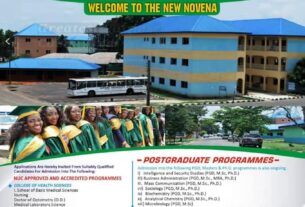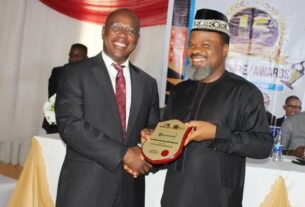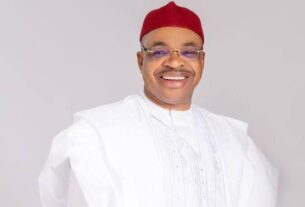
The Labour Party Presidential candidate, Mr Peter Obi at Thursday’s proceeding, tendered results from 115 local government areas (LGAs).
The court has admitted evidence presented by the Labour Party and its presidential candidate, Peter Obi, to support its claim challenging the victory of President Bola Tinubu of the All Progressives Congress (APC).
Lead counsel to Obi on Friday informed the court sitting in Abuja that he had a schedule of more evidence which they desire to render before the court.
The counsel continued with evidence (election results) from Rivers and Kogi states, presenting certified true copies of INEC election results from six local government areas (LGAs) in Rivers State as evidence.
Again, counsels to the first, second and third respondents objected to the admissibility of the evidence.
However, the court admitted the documents as evidence, while awaiting the arguments of the respondents who are opposed to the admissibility of the documents.
Apart from evidence from Rivers and Kogi states, the petitioner also presented additional certified true copies of Election results from Bida LGA of Niger state, and 21 LGAs in Adamawa state.
Obi and his party’s National Chairman, Julius Abure, arrived in court around 9:20 am for continuation of the hearing at the Presidential Election Petitions Tribunal.
At Thursday’s proceeding, the Labour Party candidate tendered results from 115 local government areas (LGAs) as part of his evidence to back his claims, but the respondents opposed the evidence tendered by the Labour Party candidate.
The LP and its candidate are challenging the victory of President Bola Tinubu of the All Progressives Congress (APC) in the February 25 election.
PROFESSOR PAT UTOMI AGAIN DISSOCIATES SELF FROM FUTILE ATTEMPT TO LINK HIM WITH A PHANTOM TINUBU’S TEAM*
The attention of Professor Pat Utomi has again been drawn to a disingenuous “List of new appointees and some new ministries” currently circulating on social media, purporting that Professor Utomi will serve as a Minister in President Bola Tinubu’s government. Nothing can be further from the truth.
We have been in constant touch with Professor Utomi who has been out of the country for over two months working on his new book, and he has confirmed that he has not held discussions with anyone with regard to any government appointment. He therefore urges Nigerians to ignore the obviously fake list associating him with the new Federal Government.
We recall that this will be the second failed attempt in nearly three months by the purveyors of the fake news to link Professor Utomi with the new government.
In a statement in March entitled “President Elect Already Working To Move Nigeria Forward,” these same fifth columnists atrociously stated that “Pat Utomi and Emir Sanusi, to lead the planning for Nigeria’s growth and development.”
Our initial instinct was to ignore this illusory piece of fake news and thereby not dignify the purveyors with a response, but after deep reflection and in consideration of the peace of the graveyard that pervades the nation we consider it expedient to dismiss this unfounded fake news and re-assure the teeming Obidients at home and in the diaspora that the Convener of Big Tent, Professor Utomi, in conjunction with the leadership of Labour Party, is committed to the cause of retrieving the mandate that Nigerians gave to Peter Obi at the polls on February 25, 2023.
CHARLES ODIBO
Director of Media and Communications
The Good, the Bad, and the Ugly Implications of Removal of Fuel Subsidies in Nigeria*
_By Dr. Chukwudi Muojieje_
In recent times, the Nigerian economic landscape has been significantly altered by a bold policy shift – the removal of fuel subsidies. Initiated by President Ahmed Bola Tinubu, this policy decision has stirred a broad spectrum of reactions, from cautious optimism to outright skepticism. As we unpack the implications of this decision, it becomes evident that there are both promising prospects (the good) and ominous concerns (the bad and the ugly).
*The good*
Economists and investment analysts have generally hailed President Tinubu’s decision. The fuel subsidy system, which was seen as a significant financial burden on the economy, has been discontinued, potentially freeing up considerable resources for other essential services and infrastructural development.
Furthermore, the unification of exchange rates – another critical policy change – is projected to improve the transparency of the foreign exchange market, discourage financial malpractices such as round-tripping, and foster an environment conducive to foreign investments. This economic recalibration could stimulate a more dynamic market environment that benefits both businesses and consumers.
*The bad *
However, there are potential drawbacks that cannot be ignored. The removal of fuel subsidies could inadvertently impact the livelihoods of many Nigerians, particularly those in lower-income brackets who have become reliant on subsidized fuel. Stakeholder engagement is, therefore, crucial to identify and mitigate potential adverse consequences of this policy shift. It is recommended that a careful and considerate approach is taken to ensure the needs and circumstances of all Nigerians are factored into policy implementation.
*The Ugly*
Beyond these immediate concerns lies a deeper, more worrying issue: Nigeria’s burgeoning debt burden. Despite the potential benefits of discontinuing fuel subsidies and unifying exchange rates, the failure to address the country’s spiraling debt situation could undermine these economic gains. The persistent borrowing has fueled inflation and contributed to a rise in interest rates, which could stifle economic growth and development.
Moreover, while President Tinubu’s ambitious target of a minimum 6% GDP growth per annum is commendable, it may prove unattainable if the focus continues to be on secondary infrastructure at the expense of primary infrastructure, as was the case under the previous administration. If the current borrowing trend persists, any increase in GDP could simply reflect inflationary growth, rather than indicating genuine economic progress.
The removal of fuel subsidies and the unification of exchange rates represent significant shifts in Nigeria’s economic policy. While these changes have the potential to foster economic growth and stability, they also carry risks that must be carefully managed. Stakeholder engagement, careful policy implementation, and a more focused approach to managing the country’s debt burden are key to ensuring that these policy changes result in real, sustainable benefits for all Nigerians. The good, the bad, and the ugly of these policies provide a comprehensive guide for navigating the economic terrain in the coming years.
In the end, the success of these policies will not be determined solely by their theoretical potential, but by the effectiveness of their implementation and the degree to which they improve the lives of everyday Nigerians. Only time will tell if the good will outweigh the bad and the ugly.



